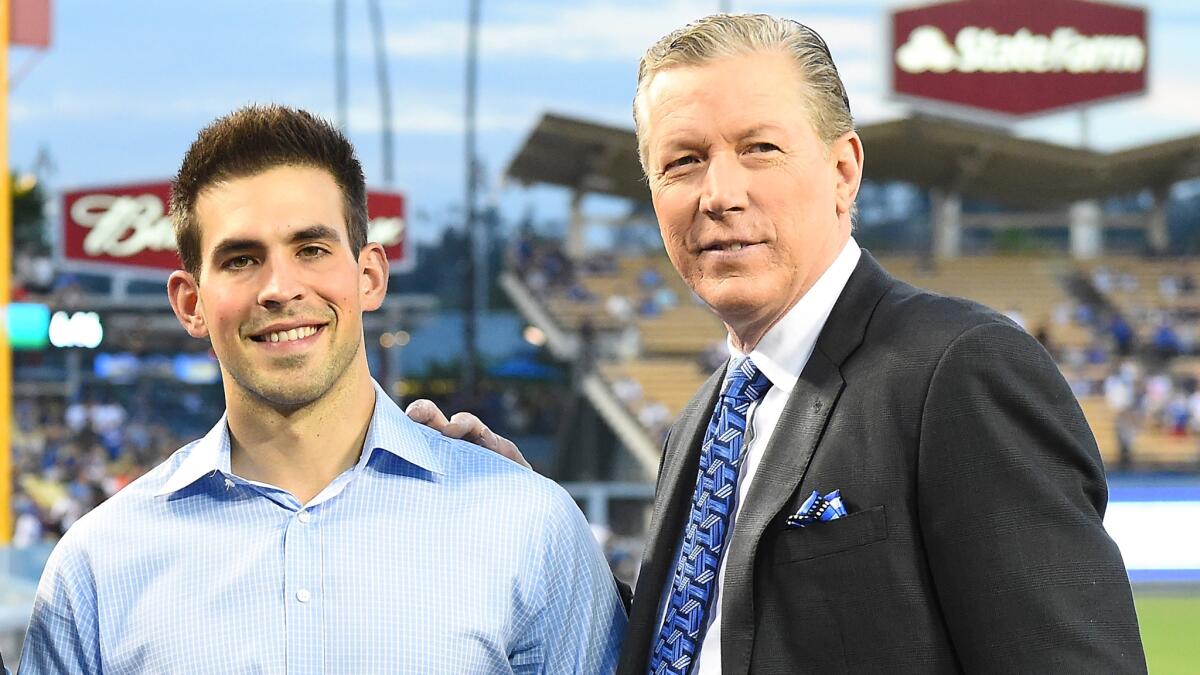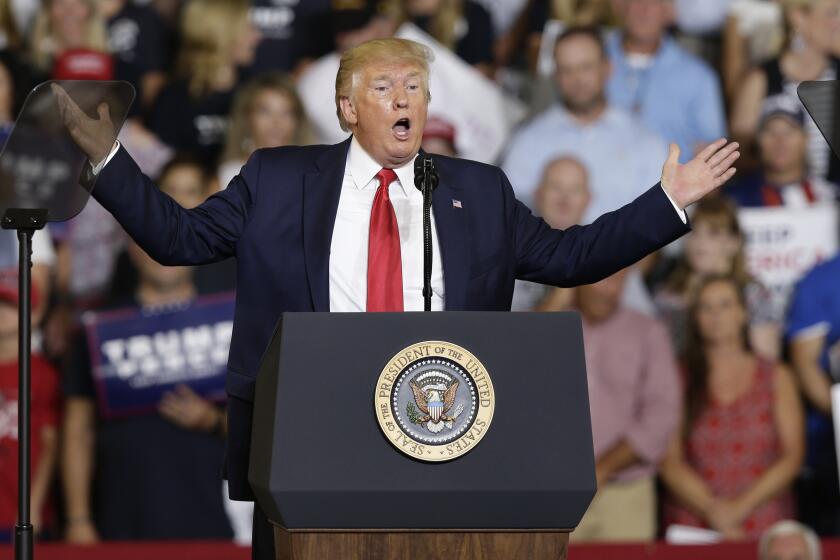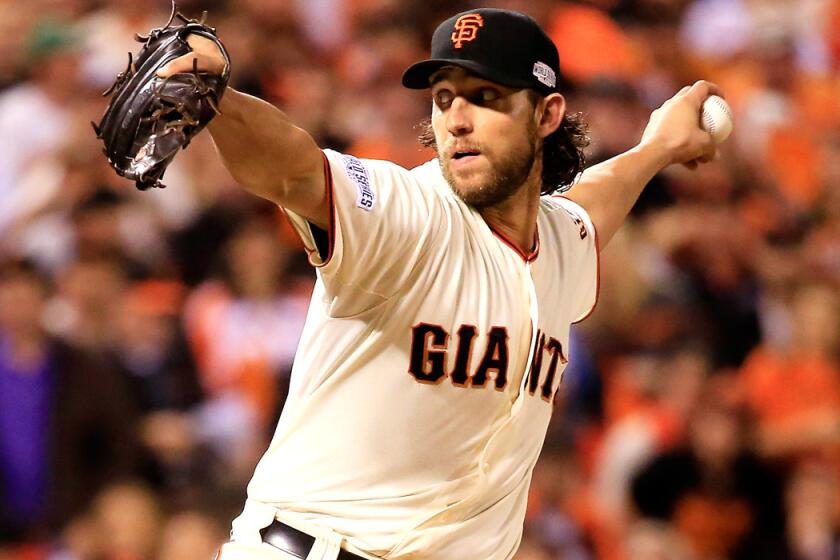Dodgers broadcasters Orel Hershiser and Joe Davis became fast friends

- Share via
Laughter filled the booth, echoing through the empty ballpark.
Joe Davis’ voice, rich and full when calling Dodgers games, was cracking. Next to him, Orel Hershiser’s giggle had turned to a guffaw. First pitch was hours away, yet the boisterous television broadcast duo was already in story mode, bouncing memories off one another in what felt like a choreographed script of lines and laughs.
It was Davis, 31, and Hershiser, 60, at their natural best. The pair are of differing generations and backgrounds. Yet they have formed an ideal partnership on and off the air.
“He is a very young 60,” Davis said, perched in the play-by-play chair he has filled the last past three seasons. “And I’m a very boring 30.”
Hershiser chuckled and chimed in: “An old soul and a young soul.”
They were reminiscing their first full season together calling Dodgers games for SportsNet LA in 2017. One moment from that year still sticks out.
During a drive to San Diego that June, Hershiser was behind the wheel. In the backseat, Davis was deputized to music duty. He scrolled through the iTunes playlist on Hershiser’s phone and stopped when he saw Eminem’s “Lose Yourself,” popularized by the 2002 film “8 Mile,” flash across the screen.
“You got this?” Davis asked Hershiser, then exactly twice his age.
“I love that movie,” Hershiser responded excitedly.
Davis tapped the song and began rapping with it. Hershiser joined in. The former pitcher, nicknamed “Bulldog” during his playing days, spit out the lyrics word for word, beat for beat. From the shotgun seat, Hershiser’s wife filmed.
After Dan Le Batard used his radio show to call out racist chants at a Trump rally, it’s apparent sports can no longer be where we go to avoid reality.
“We’re going to break the Internet,” Davis exclaimed as he uploaded the video to Twitter, posting a 24-second snapshot of their friendship — an unexpected, cross-generational bond that has become a central cog to their broadcasts in Los Angeles.
“It’s the single most important thing for why we’re having a great time,” Davis said. “And hopefully people are enjoying listening to us, because we have become such great friends. He truly is one of my best friends in the world. You couldn’t force that.”
The two started working together four years ago. Davis, a Michigan native who played Division III football, rose quickly through the baseball broadcasting ranks. With Vin Scully nearing retirement, the Dodgers hired Davis to call road games in 2016 before handing him the full play-to-play job the next year. Hershiser, who won a Cy Young Award and went to three All-Star games during his career with the Dodgers, was one of the first people Davis met in Los Angeles and has been with him at every step.
Even before Davis officially took the job, Hershiser left him “this voicemail saying, ‘Hey, just want to let you know, I really enjoyed meeting you. This is going to be great.’”
On paper, the two seemed like a mismatch. Hershiser is a baby boomer, Davis a millennial. They were raised during different eras of baseball. By the time Hershiser made his final All-Star game in 1989, Davis hadn’t had his second birthday.
But in the booth, their approaches are in lockstep. It has forged a friendship that comes across on the air — in the form of tales from the road, discussions about the direction of the game, and their ability to give games a big-time feel.
“I think what we share in common is a love for the game, and a love for the game in 2019,” Davis said. “You hear a lot of people who want to nitpick the game as it’s currently played, and this is a credit to him. This is the only game I know, this last decade of baseball. But he has evolved as the game has evolved, and embraced the things that are now governing the game. I think that’s an important thing to be on the same page on. I think we definitely are.”
They share in a deliberate and organized preparation process, and both called the audience their top priority. They have an unspoken understanding of air time, able to take a step back when the other is on a roll. Along with field-level reporter Alanna Rizzo, they’ve turned Dodgers broadcasts into a non-stop conversation, inviting the audience in instead of shutting one another out.
“We both like being wrong,” Hershiser said. “That means we’re learning. We’re not sensitive about being wrong. We encourage debate.”
Producer Mike Levy said he was “shocked” by how quickly the team progressed in the post-Scully era.
The playoff competition in Major League Baseball is so heated that it might stifle the action at the league’s trade deadline.
“[Orel] is so welcoming and open and wants to be great and wants to help everybody, and Joe is so wise beyond his years, that now when you look back, I guess it all kind of made sense,” Levy said. “But at that time, it was amazing just to watch it go down.”
Hershiser likened that process to his playing days, when as a veteran he would welcome rookies into the clubhouse. At first, he helped Davis get acclimated to MLB life. Hershiser noted that Davis has started picking places for dinner on trips more often, finally having learned the best restaurants in each big league city.
Once they started calling the full schedule, including taking over home games from Scully in 2017, Davis’ feet were under him. Their relationship flourished.
“When all of a sudden we did home games and you have the home fans and you look out and this is our office,” Hershiser said, “that’s when our friendship really went to another level.”
Seamlessly keeping the dialogue alive, Davis quickly added, “That was the moment when we weren’t the ‘other crew.’ We were the only crew. There’s probably something galvanizing about that.”
More to Read
Are you a true-blue fan?
Get our Dodgers Dugout newsletter for insights, news and much more.
You may occasionally receive promotional content from the Los Angeles Times.











